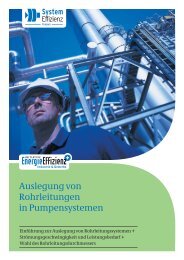biogaspartner – a joint initiative.
biogaspartner – a joint initiative.
biogaspartner – a joint initiative.
You also want an ePaper? Increase the reach of your titles
YUMPU automatically turns print PDFs into web optimized ePapers that Google loves.
Introduction.<br />
There are many good reasons for biomethane.<br />
one of the most efficient ways of using biomass for energy production<br />
is the generation of biogas. Innovative technologies are<br />
available on the market, allowing biogas to be upgraded to natural<br />
gas quality <strong>–</strong> also called “biomethane” or “bio-natural gas”<br />
<strong>–</strong> and to be fed into the natural gas grid. This process enables the<br />
replacement of conventional natural gas in many areas, thus<br />
representing an important contribution to climate protection.<br />
Currently, about 30 plants feed biomethane into the natural<br />
gas grid in Germany. several other projects are currently being<br />
planned or constructed, with a clear growth trend.<br />
This brochure provides an overview on the various stages<br />
along the value chain of biomethane, from its production to its<br />
4 B I o G a s P a r T n E r <strong>–</strong> a j o I n T I n I T I a T I v E<br />
applications as well as on political parameters and the market<br />
development of biogas injection in Germany and Europe. The<br />
key virtues and versatility of biomethane are presented in brief<br />
in the following.<br />
Active.climate.protection..<br />
Biomethane extracted from biomass can replace fossil-based<br />
natural gas. It can in this way abate the emissions from greenhouse<br />
gases, and thus achieve an important contribution to<br />
a sustainable and environmentally friendly energy economy.<br />
natural energy sources like biomethane release only as much<br />
Co as is absorbed from the atmosphere by plants as they<br />
2<br />
mature. Thereby, the ideal circumstances for climate-neutral<br />
energy consumption become conceivable.<br />
Reduced.import.dependency.<br />
some 97 percent of Germany’s oil and over 80 percent of the<br />
country’s natural gas is imported. Biomethane, on the other<br />
hand, is created from indigenous, renewable resources and<br />
organic waste products. Legitimate prognoses project a sufficient<br />
amount of resources for biomethane to supply 10 percent<br />
of Germany’s demand for natural gas by 2030. These calculations<br />
take into consideration Germany’s overall energy goals<br />
for the future. This approach would allow the country to import<br />
less natural gas, and to significantly increase energy security<br />
simultaneously.









